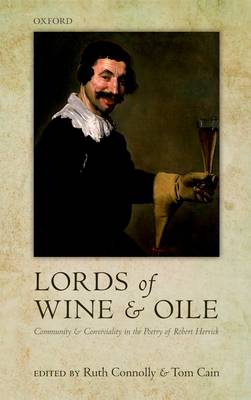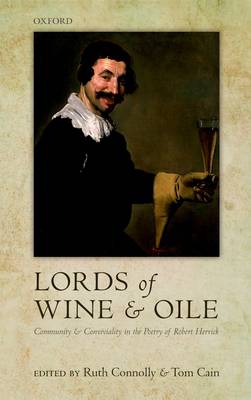
- Retrait gratuit dans votre magasin Club
- 7.000.000 titres dans notre catalogue
- Payer en toute sécurité
- Toujours un magasin près de chez vous
- Retrait gratuit dans votre magasin Club
- 7.000.0000 titres dans notre catalogue
- Payer en toute sécurité
- Toujours un magasin près de chez vous
'Lords of Wine and Oile'
Community and Conviviality in the Poetry of Robert Herrick
Ruth Connolly, Tom Cain
Livre relié | Anglais
202,45 €
+ 404 points
Description
'Lords of Wine and Oile' provides a long overdue book-length appraisal of the major seventeenth-century poet Robert Herrick. The collection reads his poetry in the context of his literary, musical, political, and religious affiliations and looks at how he both presents and constructs ideals of community through his work. Herrick is best known for his poetry's grace, good humour, and tolerant inclusiveness, characteristics at odds with the publication of his work close to the end of the Civil Wars. His collection places Herrick's poetry in a much wider chronological context beginning with his early career as a manuscript poet in Jacobean London. Contributors present original research to situate Herrick within the coteries of Ben Jonson and Thomas Stanley, uncover the Royalism of Herrick's publishers, and identify the printer of Hesperides. Others examine how the context of publication in 1648 gives a political colouring to Herrick's imitations of Ovid and Anacreon and how
Herrick, like Katherine Philips, uses the theme of friendship and the mode of print to construct an idea of the autonomous author. Two essays explore Herrick's musical collaborations with Henry Lawes, the first such work since 1976, and analyse the influence of musical settings and group performance on the interpretation of Herrick's lyrics. The collection also showcases an important debate on the challenges posed by Herrick's work, which consciously rejects competitive anxiety and narrative momentum, for historicist and postmodernist literary criticism. Contributors include Stella Achilleos, Line Cottegnies, John Creaser, Achsah Guibbory, Stacey Jocoy, Leah Marcus, Katharine Eisaman Maus, Nicholas McDowell, Michelle O'Callaghan, Graham Parry, Syrithe Pugh, and Richard Wistreich.
Herrick, like Katherine Philips, uses the theme of friendship and the mode of print to construct an idea of the autonomous author. Two essays explore Herrick's musical collaborations with Henry Lawes, the first such work since 1976, and analyse the influence of musical settings and group performance on the interpretation of Herrick's lyrics. The collection also showcases an important debate on the challenges posed by Herrick's work, which consciously rejects competitive anxiety and narrative momentum, for historicist and postmodernist literary criticism. Contributors include Stella Achilleos, Line Cottegnies, John Creaser, Achsah Guibbory, Stacey Jocoy, Leah Marcus, Katharine Eisaman Maus, Nicholas McDowell, Michelle O'Callaghan, Graham Parry, Syrithe Pugh, and Richard Wistreich.
Spécifications
Parties prenantes
- Auteur(s) :
- Editeur:
Contenu
- Nombre de pages :
- 280
- Langue:
- Anglais
Caractéristiques
- EAN:
- 9780199604777
- Date de parution :
- 11-10-11
- Format:
- Livre relié
- Format numérique:
- Genaaid
- Dimensions :
- 218 mm x 147 mm
- Poids :
- 561 g

Les avis
Nous publions uniquement les avis qui respectent les conditions requises. Consultez nos conditions pour les avis.






